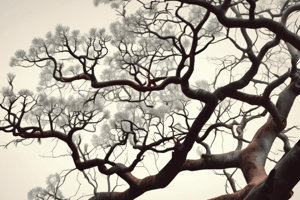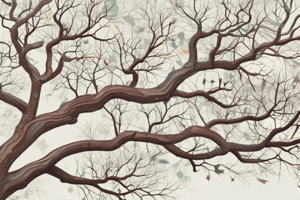Podcast
Questions and Answers
Which branch of biology is concerned with the study of interactions between organisms and their environment?
Which branch of biology is concerned with the study of interactions between organisms and their environment?
- Ecology (correct)
- Microbiology
- Biochemistry
- Botany
What is the primary function of the mitochondria in a cell?
What is the primary function of the mitochondria in a cell?
- Protein synthesis
- Waste management
- Cell division
- Energy production (correct)
Which of the following is NOT a level of organization in an organism?
Which of the following is NOT a level of organization in an organism?
- Ecosystem (correct)
- Organism
- Tissue
- Organ system
What is the process by which cells generate energy from glucose?
What is the process by which cells generate energy from glucose?
Which mechanism of evolution results in a random change in gene frequency?
Which mechanism of evolution results in a random change in gene frequency?
What is the term for the study of the physical principles underlying biological processes?
What is the term for the study of the physical principles underlying biological processes?
Which of the following is a type of evolution that occurs within a population over time?
Which of the following is a type of evolution that occurs within a population over time?
Which domain of life includes organisms with complex cells that have a true nucleus?
Which domain of life includes organisms with complex cells that have a true nucleus?
Flashcards are hidden until you start studying
Study Notes
Branches of Biology
- Botany: study of plants
- Zoology: study of animals
- Microbiology: study of microorganisms
- Ecology: study of interactions between organisms and their environment
- Biochemistry: study of chemical processes in living organisms
- Molecular Biology: study of biological molecules and their interactions
- Genetics: study of heredity and variation
- Evolutionary Biology: study of the processes that have shaped the diversity of life
- Biophysics: study of the physical principles underlying biological processes
- Biostatistics: study of statistical methods in biology
Cell Biology
- Cell Structure:
- Plasma membrane: outer layer of the cell
- Cytoplasm: jelly-like substance inside the cell
- Nucleus: control center of the cell
- Mitochondria: powerhouses of the cell
- Endoplasmic reticulum: network of membranous tubules and cisternae
- Cell Processes:
- Photosynthesis: process by which plants convert light energy into chemical energy
- Cellular respiration: process by which cells generate energy from glucose
- Cell division: process by which cells reproduce themselves
- Gene expression: process by which cells turn genetic information into protein
Organismal Biology
- Levels of Organization:
- Organism: individual living thing
- Organ system: group of organs that work together
- Organ: self-contained part of an organism
- Tissue: group of similar cells that work together
- Cell: basic unit of life
- Body Systems:
- Nervous system: controls and coordinates body functions
- Circulatory system: transports oxygen and nutrients to cells
- Respiratory system: exchanges oxygen and carbon dioxide
- Digestive system: breaks down food into nutrients
- Immune system: defends against pathogens and disease
Evolution and Diversity
- Mechanisms of Evolution:
- Natural selection: process by which populations adapt to their environment
- Genetic drift: random change in gene frequency
- Mutation: change in DNA sequence
- Gene flow: movement of genes between populations
- Types of Evolution:
- Microevolution: change within a population over time
- Macroevolution: change between different species over time
- Diversity of Life:
- Kingdoms: Monera, Protista, Fungi, Plantae, Animalia
- Domains: Archaea, Bacteria, Eukarya
Branches of Biology
- Botany studies plants and their interactions with the environment.
- Zoology focuses on animals, their structure, behavior, and evolution.
- Microbiology examines the characteristics, habits, and impact of microorganisms.
- Ecology explores the relationships between organisms and their environment, including energy flow and nutrient cycling.
- Biochemistry delves into the chemical processes that occur within living organisms.
- Molecular Biology investigates the structure, function, and interactions of biomolecules.
- Genetics researches heredity, variation, and the transmission of traits.
- Evolutionary Biology investigates the processes that have shaped the diversity of life on Earth.
- Biophysics applies physical principles to understand biological phenomena.
- Biostatistics develops and applies statistical methods to analyze biological data.
Cell Biology
Cell Structure
- The plasma membrane is the outer layer of the cell, regulating what enters and leaves.
- Cytoplasm is a jelly-like substance inside the cell where metabolic processes occur.
- The nucleus is the control center of the cell, containing most of its genetic material.
- Mitochondria are the powerhouses of the cell, generating energy through cellular respiration.
- The endoplasmic reticulum is a network of membranous tubules and cisternae involved in protein synthesis and transport.
Cell Processes
- Photosynthesis is the process by which plants convert light energy into chemical energy.
- Cellular respiration is the process by which cells generate energy from glucose, resulting in ATP production.
- Cell division is the process by which cells reproduce themselves, involving mitosis and meiosis.
- Gene expression is the process by which cells turn genetic information into protein, involving transcription and translation.
Organismal Biology
Levels of Organization
- An organism is an individual living thing, composed of organ systems.
- An organ system is a group of organs that work together to perform specific functions.
- An organ is a self-contained part of an organism, performing specific functions.
- Tissue is a group of similar cells that work together to perform specific functions.
- A cell is the basic unit of life, capable of reproducing itself.
Body Systems
- The nervous system controls and coordinates body functions, transmitting and processing information.
- The circulatory system transports oxygen and nutrients to cells and removes waste products.
- The respiratory system exchanges oxygen and carbon dioxide between the environment and the body.
- The digestive system breaks down food into nutrients, which are absorbed and utilized by the body.
- The immune system defends against pathogens and disease, involving both nonspecific and specific defenses.
Evolution and Diversity
Mechanisms of Evolution
- Natural selection is the process by which populations adapt to their environment, resulting in increased fitness.
- Genetic drift is the random change in gene frequency, leading to genetic variation.
- Mutation is a change in DNA sequence, resulting in new alleles or genetic variation.
- Gene flow is the movement of genes between populations, increasing genetic variation.
Types of Evolution
- Microevolution is the change within a population over time, resulting in adaptation.
- Macroevolution is the change between different species over time, resulting in speciation.
Diversity of Life
- Kingdoms are taxonomic groups, including Monera, Protista, Fungi, Plantae, and Animalia.
- Domains are the highest taxonomic rank, including Archaea, Bacteria, and Eukarya.
Studying That Suits You
Use AI to generate personalized quizzes and flashcards to suit your learning preferences.




